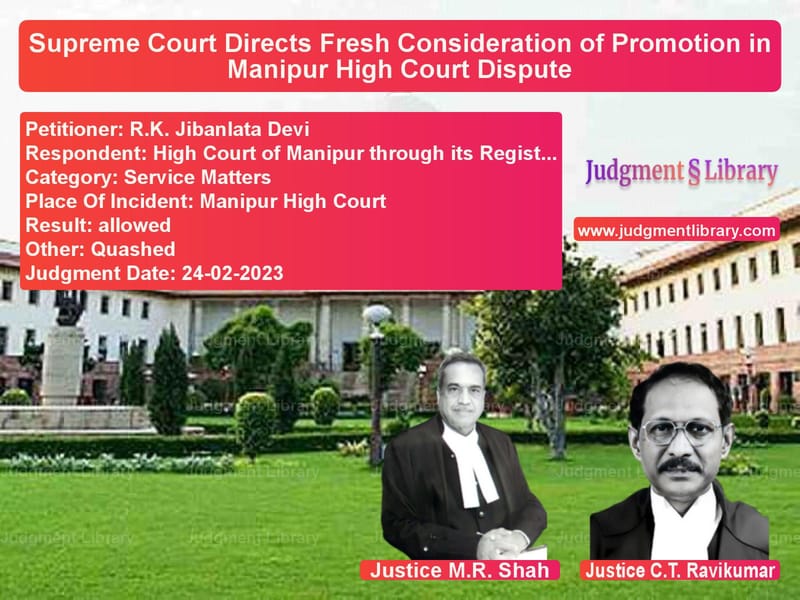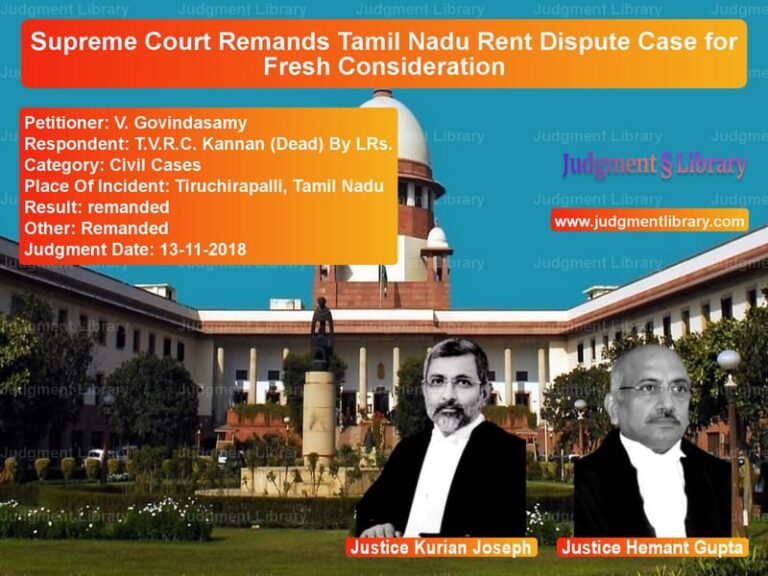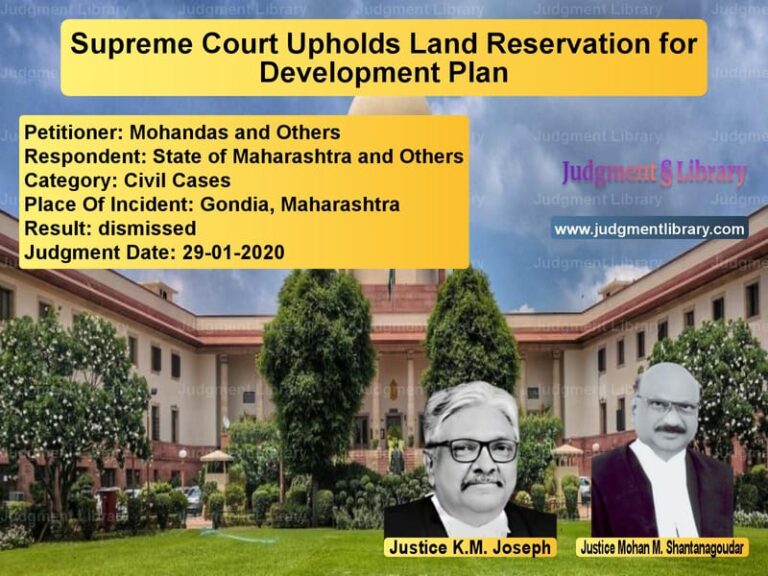Supreme Court Directs Fresh Consideration of Promotion in Manipur High Court Dispute
The Supreme Court of India, in the case of R.K. Jibanlata Devi vs. High Court of Manipur, addressed a crucial service matter concerning the promotion of a judicial employee. The Court ruled in favor of the petitioner and directed a fresh consideration of her promotion to the post of Assistant Registrar, emphasizing that uncommunicated Annual Confidential Reports (ACRs) could not be used to deny promotion.
Background of the Case
The petitioner, R.K. Jibanlata Devi, was an employee of the Gauhati High Court before the establishment of the Manipur High Court in 2013. She was promoted to Superintendent in 2012 and became eligible for promotion to the post of Assistant Registrar. However, when the Departmental Promotion Committee (DPC) met on April 9, 2021, her name was not recommended.
The petitioner challenged this decision, arguing that she was the senior-most among the eligible candidates and that her ACRs for 2016-17 and 2019-20 had unfairly affected her chances of promotion.
Arguments by the Petitioner
The petitioner, through her counsel, made the following key arguments:
- The post of Assistant Registrar became vacant in February 2019, and the applicable rules at that time (Gauhati High Court Service Rules, 1967) mandated promotion based on seniority-cum-merit. However, the DPC considered her case under the new Rules of 2020, which changed the selection criteria.
- The ACR for 2016-17 had a grading of “Good,” but it was never communicated to her, violating the principles of natural justice.
- The ACR for 2019-20 was communicated to her on April 8, 2021, just one day before the DPC meeting. The rules allowed her 15 days to submit a representation, but the DPC proceeded without waiting for her response.
- If these two ACRs were ignored, she would have had a strong case for promotion as she had received a “Very Good” grading in 2017-18 and 2018-19.
Arguments by the Respondents (High Court of Manipur)
The High Court of Manipur, through its counsel, countered:
- The Rules of 2020 were in effect when the DPC met, and therefore, they were correctly applied.
- All candidates were treated fairly, and the petitioner had not been singled out.
- The DPC made its decision based on objective criteria, and there was no procedural violation.
- Other candidates who received their ACRs on April 8, 2021, had submitted their representations the very next day, and the petitioner could have done the same.
Supreme Court’s Observations
The Supreme Court noted the following:
- The ACR for 2016-17 was not communicated to the petitioner before the DPC meeting, violating the law.
- The ACR for 2019-20 was given to the petitioner only one day before the DPC meeting, not allowing her the 15-day period to file a representation.
- As per previous rulings (Sukhdev Singh vs. Union of India (2013) and Rukhsana Shaheen Khan vs. Union of India (2018)), an employee cannot be denied promotion based on an uncommunicated ACR.
- Considering that the petitioner had received “Very Good” gradings in 2017-18 and 2018-19, the denial of promotion was unjustified.
Final Judgment
The Supreme Court ruled:
- The DPC proceedings of April 9, 2021, denying promotion to the petitioner were quashed.
- The High Court of Manipur was directed to reconsider the petitioner’s promotion, ignoring the ACRs of 2016-17 and 2019-20.
- The fresh decision was to be made within six weeks of the judgment.
- If the petitioner was promoted, she would be entitled to all consequential benefits, including arrears and seniority, from April 9, 2021.
Implications of the Judgment
The ruling clarifies key aspects of service law:
- Uncommunicated ACRs Cannot Be Used: ACRs must be officially communicated before being considered in promotion decisions.
- Promotion Rules Should Be Applied Fairly: When vacancies arise, the applicable rules at that time should be followed.
- Natural Justice Must Be Upheld: Employees must be given adequate time to respond to ACRs before they are used in career-altering decisions.
Conclusion
The Supreme Court’s ruling in R.K. Jibanlata Devi vs. High Court of Manipur reinforces the principle of fairness in service matters. By overturning the DPC’s decision and directing a fresh consideration, the judgment ensures that promotions are granted based on just and transparent criteria, safeguarding employees’ rights.
Petitioner Name: R.K. Jibanlata Devi.Respondent Name: High Court of Manipur through its Registrar General and others.Judgment By: Justice M.R. Shah, Justice C.T. Ravikumar.Place Of Incident: Manipur High Court.Judgment Date: 24-02-2023.
Don’t miss out on the full details! Download the complete judgment in PDF format below and gain valuable insights instantly!
Download Judgment: r.k.-jibanlata-devi-vs-high-court-of-manipu-supreme-court-of-india-judgment-dated-24-02-2023.pdf
Directly Download Judgment: Directly download this Judgment
See all petitions in Promotion Cases
See all petitions in Public Sector Employees
See all petitions in Disciplinary Proceedings
See all petitions in Judgment by Mukeshkumar Rasikbhai Shah
See all petitions in Judgment by C.T. Ravikumar
See all petitions in allowed
See all petitions in Quashed
See all petitions in supreme court of India judgments February 2023
See all petitions in 2023 judgments
See all posts in Service Matters Category
See all allowed petitions in Service Matters Category
See all Dismissed petitions in Service Matters Category
See all partially allowed petitions in Service Matters Category







